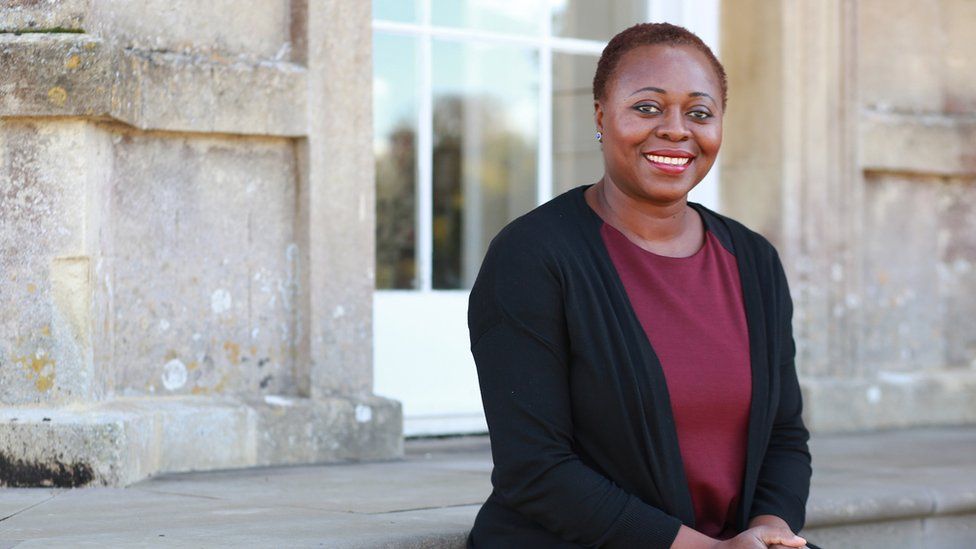'I don't want to be the UK's only black female history professor'
- Published

The UK's first black female history professor says she hopes she's not "the only one" for long.
Olivette Otele was awarded a professorship and a chair in history by Bath Spa University last month.
"I think structural barriers prevent people who look like me and from other ethnic backgrounds from reaching the ladder and achieving certain things.
"You have to work harder, much harder," Professor Otele told the BBC on being announced as one of its 100 Women 2018.
Fewer than one in 100 history professors working in the UK today is from a black background, a study by the Royal Historical Society recently found. Around 94% are from a white background.
A survey carried out at the same time suggested that almost one in three of the black and minority ethnic historians working in higher education who responded said they had been directly discriminated against or abused on the basis of their race or ethnicity.
"UK academia is very hard in general for anybody," says Professor Otele, "but even harder for people of other backgrounds.
"Historians are a very close-knit group. It's not surprising that there's only two of us; first a black man who was appointed two years ago and now me."
Professor Otele, who is originally from Cameroon, specialises in collective memory and geopolitics, particularly related to the colonial history of Britain and France.
She holds a PhD in history from Sorbonne University in Paris and has previously written about slavery, feminism and politics.
"I've worked very hard and kept pushing and had a family," she says. "It's hard. I'm tired. It's bleak."
The research from the Royal Historical Society suggests that lack of diversity has a real impact on the "quality of teaching, learning and research in history in the UK". The organisation has made recommendations for how the education system can improve.
"Recent research in black history, histories of migration and ethnicity, and histories of race, imperialism and decolonisation has transformed our knowledge and understanding of the British, European and global past," the report states.
But this research isn't making its way into the curriculum and "the racial and ethnic profile of students and staff in UK university history departments has remained overwhelmingly white".
While "racial and ethnic inequality is a pressing issue", which the Royal Historical Society says must be tackled as a matter of priority, Professor Otele says there are some signs of promise for the future.
"Things are already changing in the UK," she says.
"There are 10 black PhD students. They're fierce. We don't just want to wait for people to give us promotion. We work hard for it."
The Young Historians Project, a non-profit organisation formed by young people, is one of the schemes she points to as a sign of things to come.
Part of their work is to support young historians of African and Caribbean heritage in Britain.
"We are just as capable," she says of academics from black and minority ethnic backgrounds, "it's just a case of giving us a chance.
"I worked very, very hard and pushed. And I'm a woman. Men go faster than us [in terms of professional progress]."
It's her hope that her achievements will inspire others to follow her path.
"We have the brains, the capability and the power to do it. Students - follow your dreams. Be realistic but follow your dreams. It can happen.
"I want to show women who look like me it can be done. I'm not super human."
What is 100 Women?
BBC 100 Women names 100 influential and inspirational women around the world every year and shares their stories.
It's been a momentous year for women's rights around the globe, so in 2018 BBC 100 Women will reflect the trailblazing women who are using passion, indignation and anger to spark real change in the world around them.